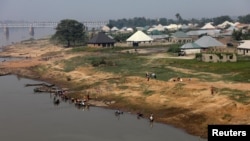Nigeria will experience torrential downpours and massive flooding this month, the Nigeria Hydrological Services Agency warns.
Nigeria is approaching the peak of its rainy season, and flooding is expected to hit 15 out of its 36 states this month. The agency has issued a red alert because of above-normal water levels on the country's two largest rivers, the Benue and the Niger.
In August, many communities along the rivers were cut off due to collapsed bridges and impassable roads. Four students were killed when a pedestrian bridge fell at a university in the northern region.
With thousands of houses and hectares of farmland and produce destroyed along with schools and shops, the economic impact of this year'sflooding is expected to be high. The country's emergency management agency is stepping in to distribute items like cement bags, blankets and hygiene products.
Peter Odjugo, a professor of geography at Nigeria's University of Benin, works with the Nigerian Meteorological Society. He has been tracking the extreme weather patterns and says the government has repeatedly failed to take preemptive measures to reduce the impact of flooding.
"What they prefer doing or what they are doing now is services after the impact, rather than preventing it from occurring," he said.
Odjugo suggests that the silt be removed from the rivers to increase the volume of water they can hold. He also recommends that town planners enforce regulation on where buildings are constructed, saying this is a glaring weak spot across the country.
City regulators look out for buildings being constructed near waterways. Such buildings are often marked with an X, designating an order to stop construction work.
Stella Ojeme, the director for information in the Federal Capital Territory Administration, says that even in the nation's capital ofAbuja, enforcing building codes is a challenge.
"Most of our people will go, buy white paint, paint off the stop work mark," she said. "First of all, you find people [building] where they shouldn't build. You find people build on flood plains. You find some people dump their refuse in the gutter."
Odjugo says climate change is making a real impact in Nigeria, but the government has not made the issue a priority.
Additional challenges
Additionally, the Nigerian Hydrological Services Agency says its weather data collection equipment is being vandalized and stolen.
Clement Eze, the agency's director general, spoke at a workshop last month, asking the public to help stop the illegal activity, as it is hindering the agency's ability to forecast extreme weather.
"We can no longer take readings, maybe accumulated or about a week or two," he said. "Or if there are no resources, it can even take more than six months before we can go back and replenish or repair and this equipment is imported from outside Nigeria."
During Nigeria's worst flooding in 2012, the Niger River reached a record high level of 12.84 meters. Two million Nigerians were forced from their homes and 363 people were killed, according to the National Emergency Management Agency.





